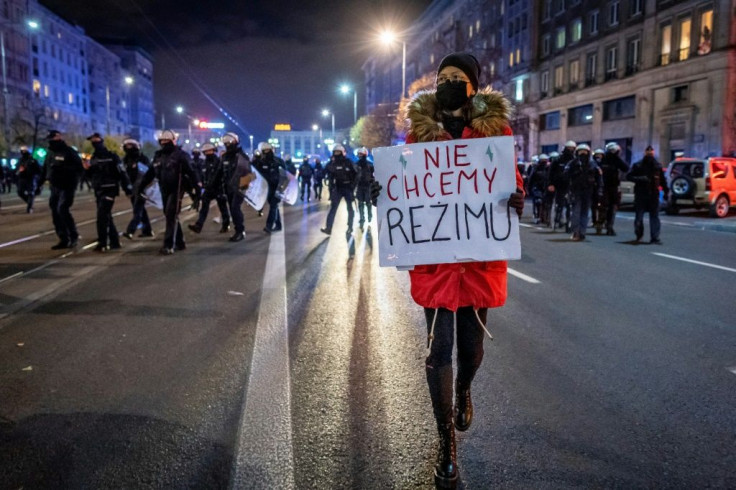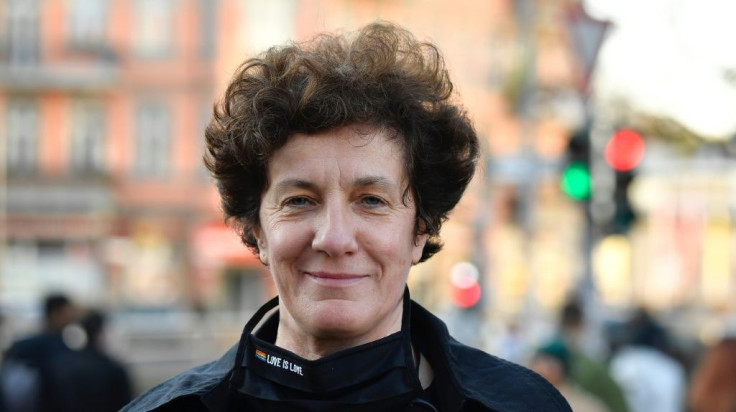'Traumatised' Poles Look Abroad After Abortion Ruling
Abortion charities are reporting a sharp increase in the number of Polish women turning to them for help after a constitutional court ruling last month to tighten legislation.
For Ciocia Basia (Aunt Basia), a Berlin-based group helping Polish women with abortions in Germany, the ruling worsens a situation already complicated by the pandemic.
"We have had a high increase in callers. Three times as many as before," Cioca Basia volunteer Ula Bertin told AFP.
The Polish court ruling struck down a provision of the law that had allowed abortions in cases of severe foetal anomalies, triggering a wave of protests.
Even though the verdict is not yet in force, activist groups say Polish doctors are now even more reticent to perform permitted abortions lest they fall on the wrong side of the law.
Bertin said that often women seeking help "were already in the process of arranging an abortion in Poland and now no one wants to do it. So they're mentally exhausted, traumatised".
"They're punished twice because the child they were awaiting has turned out to be sick and may not survive, but they're being forced to deliver. It's emotional torture."
Other organisations are reporting a similar uptick in calls for help, despite the difficulties of foreign travel because of measures to curb the spread of the coronavirus.

Abortion Without Borders (AWB), a multinational coalition, said that since the ruling it has helped 40 women travel or arrange to travel abroad for abortion -- already more than double its monthly average.
Mara Clarke from AWB said the sudden increase in calls from Polish women was also due to the fact that "protesters were chanting the name of our organisation and phone number" at the mass nationwide demonstrations.
Since launching in December, the network has provided information on how to access pills to hundreds of Poles who then had at-home medical abortions -- a grey zone in Poland, neither authorised nor banned by law.
For those requiring a surgical procedure, the coalition offers logistical and financial support so they can abort in Austria, Britain, Germany or the Netherlands.
Kasia Roszak, from the coalition's Dutch group Abortion Network Amsterdam, said many recent callers had abortions planned at Polish hospitals and "were sort of left on their own".
Some had got referrals for the procedure but were told that no one would actually undertake it. Others saw their appointments indefinitely postponed.

"So they had to scramble for another solution," she told AFP.
Even before the court ruling, some who qualified in Poland would contact the group after sensing that doctors were playing for time to avoid the procedure.
"The legal abortion process was already complicated and not very user-friendly," said Roszak.
Poland has some of Europe's most restrictive abortion laws and the ruling would allow terminations only in cases of rape, incest and when the life of the mother is at stake.
A country of 38 million, Poland sees fewer than 2,000 legal abortions every year, according to official statistics. Women's groups estimate that another 200,000 women abort illegally or abroad.
When Warsaw resident Hanna was in her early 20s and not ready to start a family, she got an abortion in the Netherlands with help from relatives there.
"I really liked how professional it was. Because I've heard from friends about Poland's abortion underground, and it's less pleasant," the 38-year-old mother-of-two told AFP.
"There's the feeling that you're doing something illegal, that you have to visit the gynaecologist on the sly at night, and the fear that if something goes wrong there's nowhere to file a complaint or to get help."
Bertin from Ciocia Basia said Poles will burst into tears after a check-up because they feel they have entered "a parallel universe where the things that for them are taboo... are for us normal, simply normal".
While Poles are now getting a little help from their friends abroad, the reverse was once true: thousands of Swedes travelled to Poland for abortions in the 1960s when they were banned at home.
Poland had unfettered access to abortion then, as today's legislation was only adopted in 1993 as part of a church-state compromise after communism.
Swedish Gender Equality Minister Asa Lindhagen said she believes it is time to return the favour and has called for the government "to stand up for Polish women" and offer free, subsidised abortions.
"No woman should have to risk her life undergoing an illegal abortion."
© Copyright AFP 2024. All rights reserved.





















